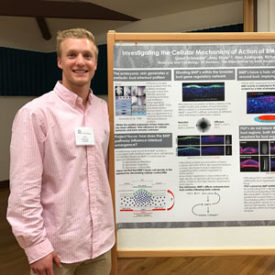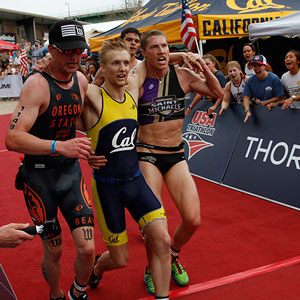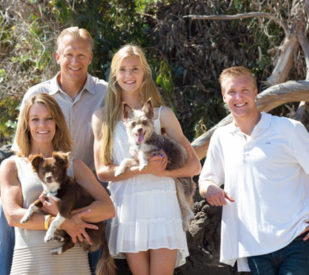In high school, Grant Schroeder’s tunnel vision earned him the nickname “Shrobot,” as in robot, as he methodically crammed for an AP calculus test during a rowdy water polo training camp.
That moniker stuck with Schroeder at UC Berkeley, where his unwavering prowess in collegiate athletics, research, public service and a 4.0 GPA has won him the coveted University Medal.
In the last month alone, he has competed in a national championship triathlon and learned that a paper he co-authored on the cellular mechanics of organ development has been accepted for publication by the venerable Science magazine.
This Saturday, May 13, Schroeder, 22, an integrative biology major, will address thousands of his peers at a campuswide commencement ceremony as UC Berkeley’s top graduating senior. Instead of cataloguing his achievements, his speech will touch on the experiences and vulnerabilities that turned him from methodical to mensch.
“At Berkeley, you can’t just grind on in a robotic way,” Schroeder says. “This campus is like a Roman Coliseum where fundamental principles, like free speech and public safety, are constantly clashing. It’s really opened my eyes and humanized me.”
A native of 30,000-population Goleta, Santa Barbara County, and the son of a two-time Olympic gold-medalist swimmer, Schroeder admits that, unlike many of his peers, he’s been sheltered from many of life’s adversities.
Defying stereotypes
“I don’t have a huge sob story or defining life story that people can easily sympathize with or empathize with,” says Schroeder. “I have had struggles here and there, but I’m not going to pretend to be someone I’m not.”
Schroeder’s mentors are quick to defend him against stereotypes:
“We were concerned that his impressive academic record might have given him a sense of arrogance that may not have fit with the often humble and less glamorous grind of day-to-day lab work,” wrote Amy Shyer, a researcher in the laboratory of molecular and cell biology professor Richard Harland, in her letter recommending Schroeder for the University Medal.
But once the research team got to know Schroeder, she wrote, “It became clear to us that despite his incredible academic success, Grant approaches work and those around him from the perspective of a rigorous hard worker, not from the perspective of a gifted diva.”
In August, Schroeder will begin a yearlong research post at Cedars-Sinai Medical Center in Los Angeles where he will experiment with stem cell therapies to regenerate skeletal tissue in animal models. He will also apply to medical school.
As an extreme athlete who has suffered nagging shoulder, back and knee injuries, as well as a bilateral hernia surgery that sidelined him for two months, Schroeder aims to do pioneering work in preventive orthopedics.
“I’ve put my body through the wringer playing all kinds of sports. I’ve seen my teammates sidelined. I’ve seen my parents and their friends battle injuries that prevent them from staying active,” he says. “My goal is to prolong healthy bodies into later life by using strength conditioning and other therapies to prevent injuries before they arise.”
Athletics are undeniably in Schroeder’s genes. His parents, Richard and Dawn, met at UC Santa Barbara as stars on the swim team. Richard Schroeder went on to win gold medals in breaststroke in the 1984 summer Olympics in Los Angeles, and the 1988 summer Olympics in Seoul, Korea.
Athleticism in his genes
“I grew up looking up to my dad and his accomplishments and trying to learn from him how to be the best all-round athlete I could be,” Schroeder says. “He told me, ‘If you want to be the best athlete, or be the best at anything, really, you have to work harder than anyone else and make sacrifices.”
All through school, Schroeder played soccer, basketball, baseball and water polo with a tight circle of competitive athletes, many of whom remain his best friends. His younger sister, Erica, is a state track and field champion headed to the University of Washington.
Meanwhile, he inherited his academic drive from his mom, who was his second-grade teacher at Kellogg Elementary in Goleta.
“I called her Mrs. Schroeder, not mom. And she was tough on me,” he says. “She really showed me how to be a good student, respect my teachers, be a good classmate, get good grades and study hard.”
After earning top scores in AP calculus, environmental science and world history, among other subjects, Schroeder entered UC Berkeley in fall 2013 as a Regents’ and Chancellor’s Scholar. He had also been accepted to UCLA.
“UCLA felt more comfortable for me, but I wanted to be a little uncomfortable in college,” he says. “Berkeley’s uniqueness and the fact that it’s the No.1 public in the nation decided it for me.”
He vividly recalls the contrast between the raucous street life on Telegraph Avenue and the view from the top of the Campanile: “I took a deep breath, and saw how beautiful the Bay Area was, and soaked it all in.”
 As an incoming freshman, he joined UC Berkeley’s top-ranked water polo team as a walk-on, and had to demonstrate his mettle: “I was the smallest player on the team and I had to work hard and prove I could make it,” he says.
As an incoming freshman, he joined UC Berkeley’s top-ranked water polo team as a walk-on, and had to demonstrate his mettle: “I was the smallest player on the team and I had to work hard and prove I could make it,” he says.
He made it. Then came the hard knocks. His high school water polo team co-captain, who had gone to UC Santa Barbara, died in a freak drowning accident. Then, the father of another close friend died from cancer.
Breaking out of his cocoon
“I’d lived a very sheltered, stable life, and it shook me up,” he says. “Experiencing loss has also been really crucial to my development.”
Another setback was the breakup of his first romantic relationship, which he began in his sophomore year: “It actually really hurts,” he says. “And that’s an intense emotion that I had never felt before.”
In his junior year, Schroeder quit water polo to focus on research and expand his horizons. He got an internship with the P3 Peak Performance Project, an organization that trains high-level athletes.
 Through the campus’s Undergraduate Research Apprentice Program, he landed a research position with the Harland Lab, where he worked closely with two postdoctoral researchers on how cells and tissue evolve into functioning organs. Specifically, they tracked follicle patterns in chicken skin to better understand the underlying mechanics of organ development.
Through the campus’s Undergraduate Research Apprentice Program, he landed a research position with the Harland Lab, where he worked closely with two postdoctoral researchers on how cells and tissue evolve into functioning organs. Specifically, they tracked follicle patterns in chicken skin to better understand the underlying mechanics of organ development.
His contributions earned him the distinction of “second author” on a paper that has been accepted for publication in Science magazine, an honor usually reserved for senior researchers. Moreover, “his key experiments also opened up a new topic area of exploration for us, which we used as the basis” for a $1 million National Institutes of Health grant, Shyer wrote in her recommendation letter.
An unexpected growth experience for him were the mental-health check-ins that his research team conducted whenever they met.
“At first I thought, ‘Why should it matter how I’m feeling? I’m just here to do work,’” he says. “But then it became refreshing to say, ‘I feel good today,’ or ‘I’m stressed out about an exam.’ It opened me up.”
As a volunteer, Schroeder mentored new undergraduates in the Harland Lab, and high school students in Oakland’s College Prep STEM research program.
And, as captain of the Cal Triathlon Team, he brought the NCAA Women’s West Region National Qualifier to UC Berkeley, allowing Cal’s top female triathletes, he says, “to compete in their own backyard.”

Photo by Ken Light
One triathlon he’ll never forget is last month’s national collegiate championship in Tuscaloosa, Alabama. There he was, charging ahead of the pack, the finish line in sight, when his legs suddenly buckled and he crashed into the barricades.
“People were passing me, and I couldn’t stand. I couldn’t use my legs,” he says. “Then out of the blue, two racers I didn’t know scooped me up and carried me to the finish line in an amazing display of sportsmanship.”
And that about sums up Schroeder’s life so far: “It’s been a crazy race to the finish line,” he says. “I’m looking forward to what comes next.”


